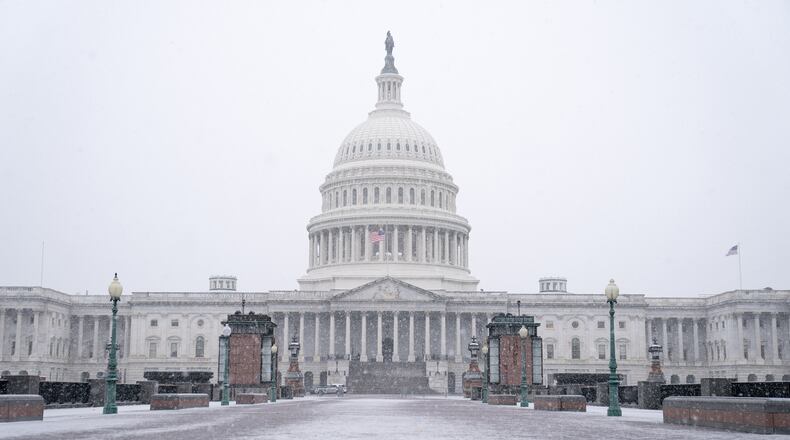The new Congress — number 117, if you’re counting — was sworn in Sunday night, and while control of the U.S. House has already been decided, the Senate is facing a more uncertain future, as two runoffs in Georgia will determine whether Republicans or Democrats will control the Senate.
Watch replay of 117th Congress being sworn in:
The House and Senate opened at noon Sunday, as required by law, with strict COVID protocols.
Nancy Pelosi was reelected as speaker of the House on Sunday afternoon. First-time members of the 117th Congress were officially sworn in about 6:35 p.m. Sunday. Other members were sworn in about 6:50 p.m., 6:55 p.m. and 7:05 p.m.
Pelosi received 216 votes to 209 for Rep. Kevin McCarthy, R-California, who again will be the chamber’s minority leader.
Despite winning the White House and maintaining control of the U.S. House, Democrats suffered several unexpected losses in November, when a long-predicted “blue wave” failed to materialize on Election Day.
In the 2018 midterms, Democrats flipped 40 seats and won back the chamber in a historic election. Two years later, however, Pelosi presided over an electoral effort that saw Democrats lose four seats in her home state of California. A total of 12 Democrats seeking reelection in November were ousted by Republicans.
House Democrats’ top goal in 2020 was to bring back their most vulnerable members who had won back the most difficult seats. But Republicans posted a strong showing, despite President Donald Trump’s loss, and have left Democrats with their smallest governing majority in 20 years.
The coronavirus has already impacted the makeup of the new Congress. Luke Letlow, Louisiana’s incoming Republican member of the U.S. House, died Tuesday night from complications related to COVID-19 only days before he would have been sworn into office. He was 41.
Letlow was admitted to a Monroe hospital on Dec. 19 after testing positive for the coronavirus. He was later transferred to a Shreveport facility and placed in intensive care. He was to fill the seat being vacated by his boss, Republican Ralph Abraham. Letlow had been Abraham’s chief of staff and ran with Abraham’s backing for the job.
Before the vote, there was little doubt Pelosi would be reelected House speaker. The only woman in history to serve as speaker, Pelosi has a reputation as a formidable vote-counter and wily deal-cutter. Those skills have helped her fend off threats and cement her as leader of her party in the House since 2003.
“Yeah, I do,” Pelosi told a reporter this week when asked if she had the votes wrapped up.
In what seemed an indication of confidence, Pelosi told reporters Wednesday that Rep.-elect Mariannette Miller-Meeks, R-Iowa, will be sworn in, even as Democratic opponent Rita Hart’s challenge to the election results remains under review by the House. Miller-Meeks is certain to vote against Pelosi to be speaker.
The raging coronavirus pandemic, combined with routine illnesses and the usual risks of wintertime travel, could make attendance unpredictable for the first House roll call in months that lawmakers will have to attend in person. To avoid risks of exposure to COVID-19, the House altered its rules to let its members vote by proxy from their homes, but that change ended with the old Congress.
The speaker’s election, in which members traditionally vote verbally in alphabetical order, has long been the first vote taken by the new House. Because of COVID concerns, lawmakers voted in groups in a roll call that lasted hours.
In a memo this week, Congress’ chief physician, Dr. Brian Monahan, and House Sergeant at Arms Paul Irving told House members that any guests, including family, will have to follow local District of Columbia requirements for COVID testing.
One of the first acts by the new Congress will happen Wednesday, when a joint session will count the votes cast by the Electoral College in December and certify Joe Biden as president-elect. Biden will be sworn in Jan. 20.
However, on Wednesday, Sen. Josh Hawley, a Republican from Missouri, said he would raise objections to Biden’s victory, forcing House and Senate votes that could delay — but not alter — the final certification of Biden’s win.
Hawley said he would object because “some states, including notably Pennsylvania,” did not follow their own election laws. Lawsuits challenging Biden’s victory in Pennsylvania have been unsuccessful.
“At the very least, Congress should investigate allegations of voter fraud and adopt measures to secure the integrity of our elections,” Hawley said.
Rich Barak of The Atlanta Journal-Constitution contributed to this report.
About the Author
The Latest
Featured



